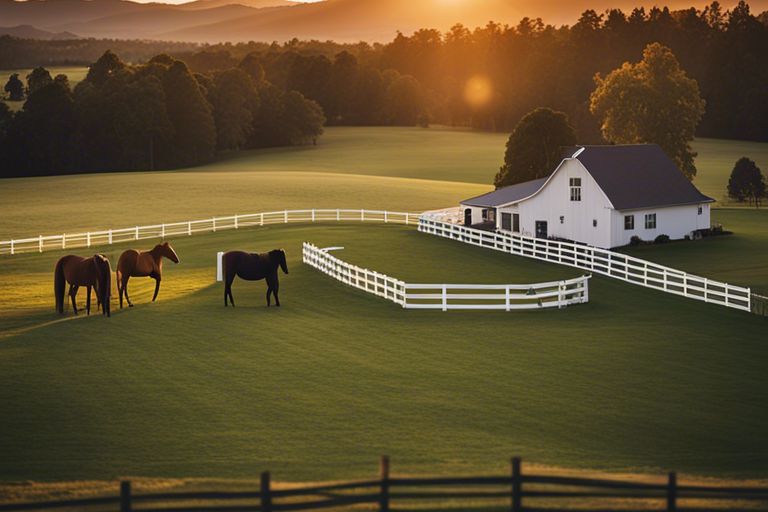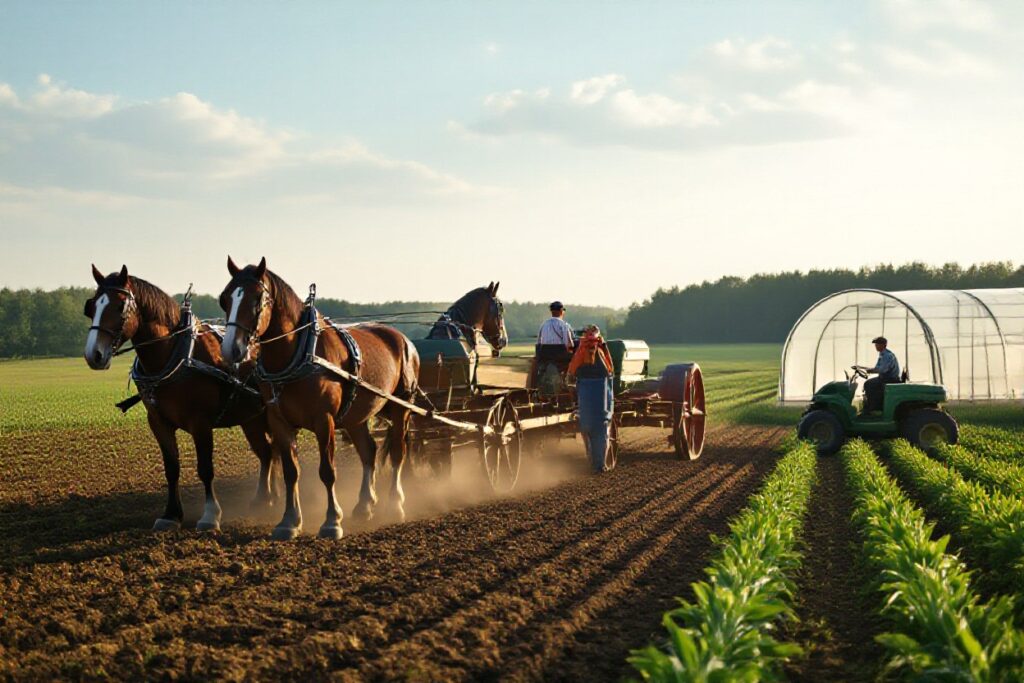You have decided to take the leap into buying horse property — a thrilling yet daunting endeavor. Choosing the right property for you and your equine companions is crucial. In this comprehensive guide, you will learn about the important factors to consider when purchasing horse property, dangers to watch out for, as well as the positive aspects that come with owning your own horse-friendly real estate.
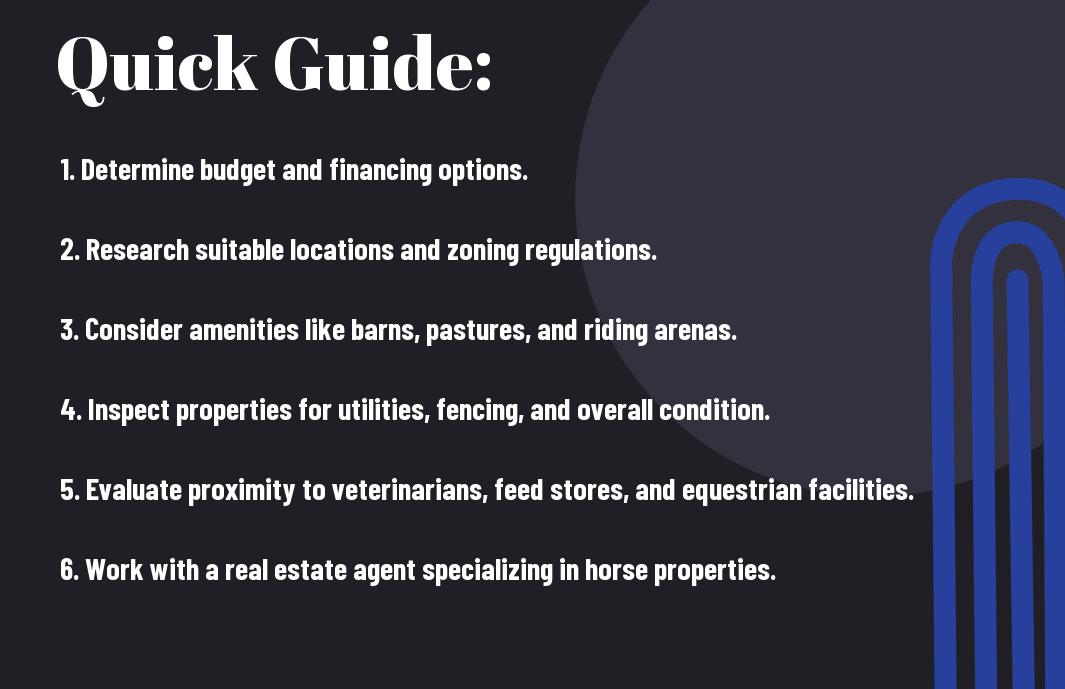
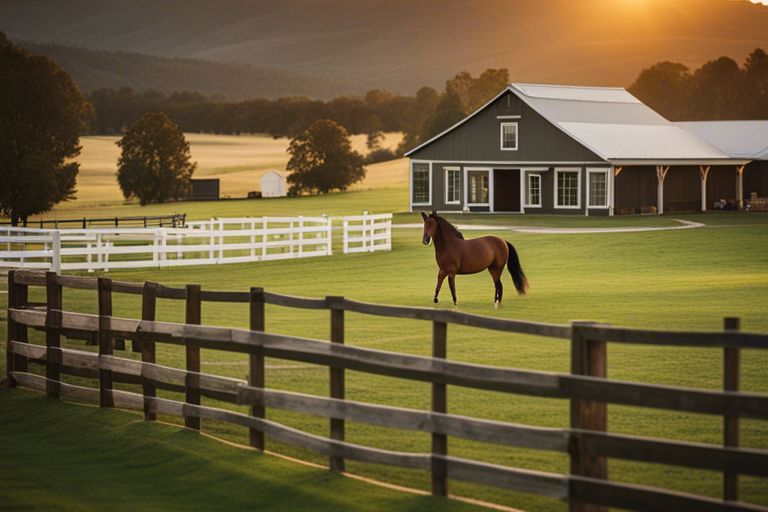
Understanding Types of Horse Properties
While looking for a property suitable for horses, it’s important to understand the different types available. Understanding the distinctions between rural and urban properties, pasture-based and arena-based setups, as well as small acreage versus large ranches will help you make an informed decision.
Rural vs. Urban Properties
The rural properties are typically located in more secluded areas with expansive land for your horses to roam freely. On the other hand, urban properties are closer to city amenities and may have smaller lots. Knowing the difference between the two will help you decide on the level of privacy and convenience you desire.
Pasture-based vs. Arena-based Properties
Urban properties often have limited space, making pasture-based options challenging. In contrast, rural properties usually have more land for pasture-based setups. When deciding, consider the amount of time you can dedicate to maintaining pastures versus the convenience of an arena-based property.
With pasture-based properties, your horses have the opportunity to graze and move around more naturally. However, arena-based properties offer a controlled environment for training and riding. Depending on your preferred activities and daily routine, one may be more suitable than the other.
Small Acreage vs. Large Ranches
With small acreage properties, you may have limited space for numerous horses and activities. Large ranches, on the other hand, provide ample room for expansion and various equestrian endeavors. A careful consideration of your current needs and future aspirations will guide you in choosing the right property size.
A smaller property may be easier to manage and more cost-effective, while a large ranch offers more flexibility and potential for growth. You should evaluate your long-term goals and resources to determine which option aligns best with your vision for your equestrian lifestyle.
Essential Factors to Consider
Even before you start searching for horse property, there are some necessary factors you should consider to ensure you find the perfect place for you and your horses.
- Zoning and Land-Use Regulations: On your list of priorities should be checking the zoning laws and land-use regulations in the area where you are considering buying horse property. It’s crucial to make sure that the property is zoned for equestrian use, as some areas have restrictions on keeping horses or may require a minimum lot size for horses. After all, you don’t want to invest in a property only to find out later that you can’t keep your horses there.
Climate and Geographic Location
Consider the climate and geographic location of the horse property you are interested in. A horse‘s health and well-being can be greatly influenced by the climate and surroundings. Climate can affect factors such as the type of pasture grass that can be grown, the prevalence of certain diseases in the area, and the seasonal weather patterns that you and your horses will experience.
A property with a mild climate may be more desirable as it can provide year-round opportunities for riding, training, and turnout for your horses.
Access to Veterinary Care and Equine Services
Carefully consider the access to veterinary care and other equestrian services in the area where the horse property is located. It’s necessary to have access to qualified veterinarians, farriers, and other equine professionals to ensure the health and well-being of your horses.
Plus, having access to equine facilities such as boarding stables, training facilities, and riding arenas nearby can be convenient and beneficial for you and your horses.
Neighboring Properties and Potential Distractions
An important factor to consider when buying horse property is the neighboring properties and potential distractions they may pose. It’s crucial to assess if there are any sources of stress or danger nearby, such as noisy highways, industrial sites, or wildlife that could startle your horses.
It is necessary to ensure that the neighboring properties will not pose health risks or distractions for you and your horses. Being aware of these factors can help you make an informed decision when selecting the perfect horse property for you and your equine partners.
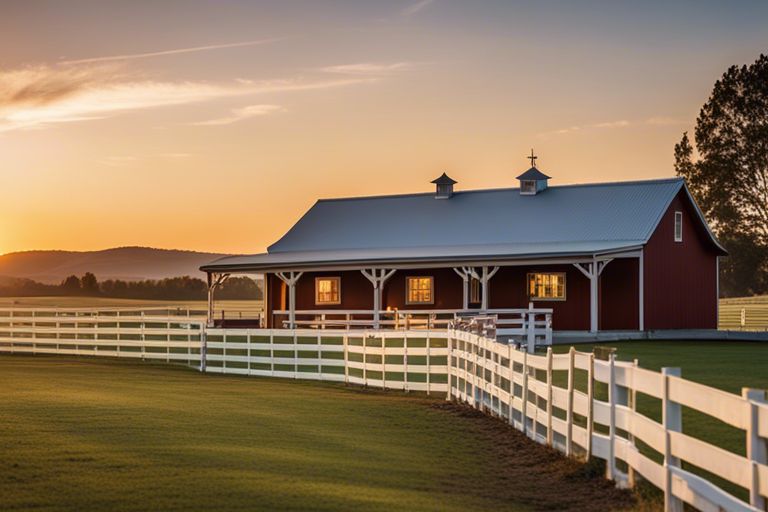
Step-by-Step Guide to Buying Horse Property
Unlike purchasing a standard residential property, buying horse property requires careful consideration of specific needs and requirements for both you and your equine companions. This step-by-step guide will help you navigate the process smoothly and make informed decisions.
Research and Planning
| Research | Planning |
| Research the local horse-friendly areas and zoning regulations. | Plan your budget carefully, considering not just the property purchase price but also ongoing maintenance costs. |
| Look into the availability of imperative amenities such as pastures, barns, and riding trails. | Plan for your future needs, such as the number of horses you intend to keep and any potential expansion. |
Working with a Real Estate Agent
If you are unfamiliar with the local real estate market or specific requirements for horse properties, it is highly recommended to work with a real estate agent who specializes in equestrian real estate. An experienced agent can help you navigate listings, negotiate offers, and ensure that the property meets your unique needs.
Inspecting the Property
| You |
| Should conduct a thorough inspection of the property, paying attention to the condition of existing horse facilities, land quality, fencing, and any potential hazards. |
When inspecting the property, look for any signs of poor drainage, toxic plants, or inadequate shelter for your horses. It’s imperative to ensure that the property meets not just your needs but also the safety and well-being of your equine companions.
StepbyStep Negotiating the Purchase
| Step-by-Step |
| Start by making a reasonable offer based on comparable sales in the area and any necessary repairs or upgrades needed on the property. |
One imperative tip for negotiating the purchase of horse property is to be prepared to walk away if the terms do not align with your needs or budget. It’s important to stay firm on your requirements while keeping an open mind for compromises that are in your best interest.
Tips for Evaluating Horse Properties
Now that you’ve decided to invest in a horse property, it’s necessary to thoroughly evaluate each potential property before making a purchase. Here are some important tips to help you assess the suitability of a horse property for your needs.
Assessing Fencing and Enclosures
Horse properties must have proper fencing and enclosures to ensure the safety and security of your animals. Inspect the perimeter fencing to check for any damages or areas where horses could potentially escape. Secure fencing such as wooden boards or PVC rails are preferable over barbed wire, which can cause injuries to horses. Additionally, evaluate the size and condition of existing pastures and paddocks to ensure they can comfortably accommodate your horses.
Evaluating Barns and Storage Facilities
Tips for evaluating barns and storage facilities include assessing the structural integrity of buildings, the presence of adequate ventilation and lighting, and checking for any signs of water damage or mold. A well-maintained barn with sufficient space for storing hay, feed, and equipment is necessary for the smooth operation of your horse property.
Understanding the layout of the barn and its proximity to pastures can also impact daily chores and the overall functionality of the horse property.
Inspecting Pastures and Grazing Land
An necessary aspect of a horse property is the quality and quantity of pastures and grazing land available. A well-maintained pasture with lush grass and proper drainage is crucial for the health and well-being of your horses. Evaluate the size of pastures in relation to the number of horses you plan to keep and consider the potential for rotational grazing to ensure sustainable land use.
Pastures are where your horses will spend a significant amount of their time, so it’s important to prioritize the quality of grazing land when evaluating horse properties.
Considering Water Availability and Quality
You should also consider the availability and quality of water sources on the horse property. Adequate access to clean water is necessary for your horses’ health and hydration needs. Test the water sources for contaminants and ensure there are no issues with water supply that could affect your ability to care for your horses.
It’s crucial to prioritize water availability and quality when evaluating horse properties to ensure the well-being of your horses.
Weighing the Pros and Cons of Horse Ownership
Once again, before you decide to buy horse property, it’s imperative to carefully consider the pros and cons of horse ownership. Take the time to evaluate whether owning and caring for horses aligns with your lifestyle and financial resources.
Benefits of Owning Horse Property
To start, owning horse property allows you to have your horses right at home, providing convenience and the ability to spend more time with your beloved animals. Additionally, having your property means you have full control over the care, management, and training of your horses.
Drawbacks and Challenges of Horse Ownership
Horse ownership also comes with its fair share of challenges. One of the main drawbacks is the significant financial investment required to purchase, feed, house, and provide veterinary care for horses. Additionally, horses require daily care and attention, which can be time-consuming and physically demanding.
Drawbacks: While the rewards of owning horses can be immense, it’s crucial to understand and prepare for the challenges that come with horse ownership to ensure you can provide the necessary care and support for these magnificent animals.
Lifestyle Considerations and Time Commitment
Challenges arise when considering the lifestyle adjustments and time commitment required for owning horse property. You must be prepared to dedicate a significant amount of time each day to caring for your horses, including feeding, grooming, exercising, and overall maintenance of the property.
A: It’s imperative to evaluate whether you have the time and commitment to devote to caring for horses before taking the plunge into horse ownership. Be honest with yourself about your lifestyle and schedule to ensure you can provide a safe and healthy environment for your horses.
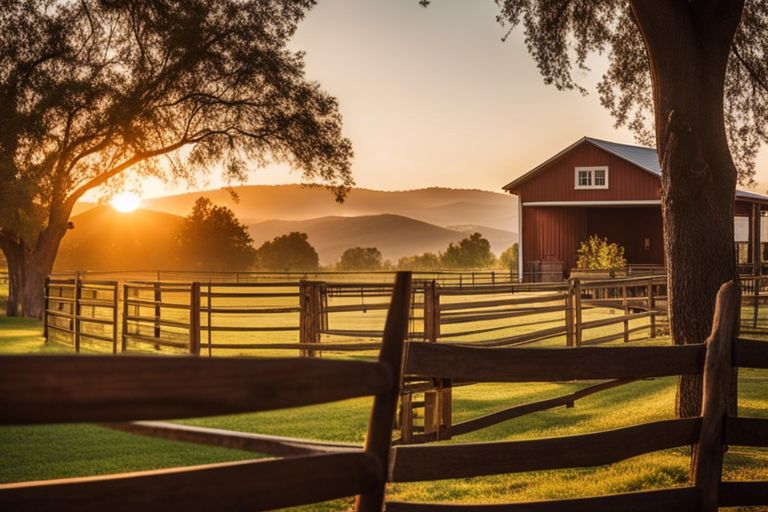
Financial Considerations and Budgeting
Purchase Price and Financing Options
For prospective horse property buyers, one of the first things you need to consider is the purchase price of the property. This will include not only the cost of the land and any structures on it but also any additional features like barns, arenas, or fencing. With respect to financing your purchase, options like traditional mortgages, rural development loans, or farm financing may be available to you based on your financial situation and the property’s location.
Ongoing Expenses and Maintenance Costs
If you’re considering buying horse property, it’s important to factor in the ongoing expenses and maintenance costs associated with owning and caring for horses. This includes expenses like feed, bedding, veterinary care, farrier services, and property maintenance. You’ll also need to budget for regular tasks like pasture maintenance, manure removal, and barn repairs to ensure the well-being of your horses and the longevity of your property.
If you’re new to horse ownership, it’s vital to understand that the costs can add up quickly. **Proper budgeting and planning** for these ongoing expenses will help you avoid financial strain and ensure that you can provide the best care for your horses.
Budgeting for Veterinary Care and Supplies
Purchasing a horse property also means budgeting for veterinary care and supplies. From routine vaccinations and check-ups to emergency care, veterinary expenses can be a significant part of your budget as a horse owner. Additionally, you’ll need to budget for supplies like feed, supplements, grooming tools, and other vitals to keep your horses healthy and comfortable.
To properly budget for veterinary care and supplies, **establishing a relationship with a reputable equine veterinarian** and researching the costs of common supplies in your area can help you anticipate and plan for these expenses. **Regular veterinary care and quality supplies are crucial** for the well-being of your horses and can contribute to their longevity and performance.
Understanding the financial aspects of owning horse property is vital for your success as a horse owner. By carefully considering purchase price, financing options, ongoing expenses, and budgeting for veterinary care and supplies, you can ensure that you are financially prepared to provide the best care for your horses and maintain your property effectively.
Final Words
To wrap up, remember that acquiring a horse property is a significant investment that requires careful considerations. Ensure that you prioritize the well-being of your horses by selecting a property that meets their needs, such as adequate pasture space and safe fencing. Additionally, think about your own needs and preferences as a horse owner to ensure that the property aligns with your lifestyle and goals. By thoroughly researching and inspecting potential horse properties, you can make an informed decision that benefits both you and your equine companions in the long run.
FAQ
Q: What factors should I consider when buying horse property?
A: When buying horse property, important factors to consider include location, acreage, zoning regulations, water source, existing infrastructure (e.g., barns, pastures), and access to trails or riding areas.
Q: How can I finance the purchase of horse property?
A: Financing options for buying horse property may include traditional mortgages, land loans, agricultural loans, or specialized equestrian property loans. It’s important to explore multiple options and work with a lender familiar with horse properties.
Q: What should I look for in terms of the horse facilities on the property?
A: When evaluating horse facilities on a property, consider the condition and size of existing barns, stables, pastures, arenas, and fencing. Look for features like proper drainage, ventilation, and layout that can support the needs of your horses.
Q: Are there any specific regulations or requirements for owning horse property?
A: Depending on the location and zoning regulations, there may be specific requirements for owning horse property, such as minimum acreage per horse, setback distances for structures, or restrictions on commercial activities. It’s important to research local ordinances and regulations.
Q: How can I ensure that the horse property is suitable for my needs?
A: To ensure the horse property meets your needs, work with a real estate agent specializing in equestrian properties who understands your requirements. Consider factors like soil quality, access to veterinary services, distance to feed and supplies, and compatibility with your equestrian activities.
